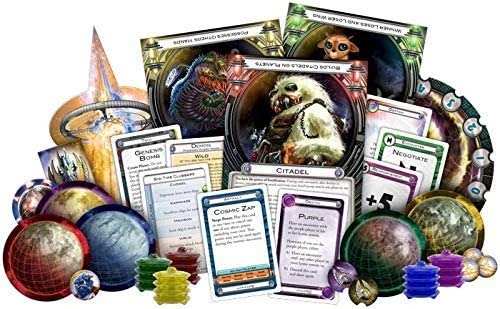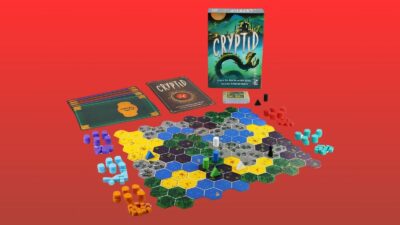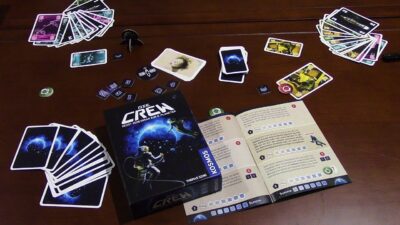What would SETTLERS OF CATAN be without negotiation? The dynamic trading aspect brings an otherwise light and luck-based economic game to life, and it’s stuck around for as long as it has because no other game has truly replicated this feature. It’s the only thing that saves MONOPOLY from being a completely worthless abomination as well. Negotiation can be a formal aspect spelled out by the rules or an informal process of temporary alliances and deals, applicable to economic games like BOHNANZA or area-control and war games like TAMMANY HALL. It comes with drawbacks for sure; preexisting friendships and group dynamics weigh heavily on the deliberations, it can grind a game to a halt if someone chooses to be a bell-end, and you can feel shut out of a large portion of the game if you don’t gain access to anything anyone wants.
COSMIC ENCOUNTER made many contributions to tabletop games. Many cite the player powers, which went beyond simple stat asymmetry as each alien was able to bend the rules in their own unique way. However, the negotiation system deserves just as much attention for discouraging long-term alliances, sowing distrust into every deal and yet setting clear parameters so players know what they are getting into.
The informal negotiation system can occur at any point during the game, but it’s concentrated during the alliance phase, where both the attacker and defender can invite players to assist them. Allies can offer a couple ships and special reinforcement cards, and they gain rewards if the side they assist wins the conflict. The formal negotiation system occurs during the encounter phase. During an encounter, the attacker and defender choose one card to play. If both of them flip over a negotiation card, they have one minute to cut a deal. If they can’t come to an agreement within a minute, both players lose a handful of ships.

One of the only flaws with COSMIC ENCOUNTER is that in the early game, there was little incentive to ally with the defense. The reward for assisting an attack was one of the five planets needed to win the game; defensive allies gained a couple cards and ships. COSMIC ENCOUNTER: INCURSION added a defensive rewards deck that offered more powerful cards and incentivized more strategy beyond always allying with the offense.
This is largely a problem early on, because in later stages the offense has to be very careful about who they invite to help. Earning an entire planet is 20 percent of the way to winning the game, so players have to weigh how much they need the help versus how dangerous it is for Bob to earn a fourth foreign colony. Similarly, a successful encounter allows players to have another encounter, so the invited allies face the same dilemma. Getting another foreign colony seems tempting, but they might hand a victory to a player who might not have won without help and suddenly waltzes their way to five planets by taking another turn. Worse yet, the offense might have a way to deny allies from gaining rewards. It’s a treacherous affair that discourages long-term alliances and promotes opportunism, making it a more socially dynamic experience.
A frequent problem with negotiation is how influenced it is by existing friendships and group dynamics. Here is where one of the game’s most maligned elements, the “fate deck,” comes in. Instead of choosing who you will attack for the turn, you draw a target from this deck. Getting just five planets seems easy, but the randomness of the attack target and the likelihood of everyone joining the defensive side means that victory without negotiating or alliances is nigh impossible. On the other hand, permanent alliances are less likely due to the risk of helping someone get a fourth planet only for them to draw you as their encounter and shut you out of a tie. It’s possible for two players to work together for the entire game to reach a joint victory, but the fate deck disincentivizes such strategy and sows seeds of doubt into any duo.
The actual negotiation cards are the beating heart of the game. Few moments are more infuriating than when an opponent in MONOPOLY refuses to take a good deal out of spite or idiocy, and sometimes a game can feel unwinnable because some douche isn’t accepting your perfectly reasonable trade. A player can choose to grind the game to a halt unless they get what they want. COSMIC tries to subvert that behavior through the timer and the additional use of the negotiation cards.

The timer forces both players to think quickly, argue down, and potentially accept a lesser deal to avoid the penalty. However, it’s possible that one of the players is planning to not accept a deal at all and wants both players to lose a ship or two. The opponent might promise they will play a negotiation card, but can you truly trust them? You never have to enter a negotiation, but will it look good to other players if you choose to attack someone who seems willing to make a deal? Will they, or someone else, betray you by playing a card that destroys a deal and makes both players lose out? In addition to all this tension, the timer prevents someone from totally holding out while still punishing them. It gives a defined endpoint as well, which both players can use to their advantage or accept the loss if it helps them out, and neither player can get too mad because they entered the process willingly.
These cards also have other uses for dealing with the all-to-common problem of an obstreperous player. For example, there are some battles you will not win because you don’t have the cards and everyone has joined the opposing side. The negotiation cards let you punish such a move by stealing cards from the opponent’s hand, a threat that might be large enough to force them to negotiate as well. On the other hand, a player can trick the opponent into thinking they will play a negotiation card, only to pull a bait and switch and instantly win a battle by playing a combat card instead. It’ll cost them a couple cards from their hand, but that might be an acceptable price to pay.
Detractors of COSMIC ENCOUNTER claim it’s too swingy and random, and it’s true that the actual mechanics are not that interesting. However, they are elevated by the dynamic alliances and negotiation into something that still holds up almost fifty years later. Even though it’s so dependent on social interaction, COSMIC ENCOUNTER never feels beholden to existing relationships and personalities. Where others see mere chaos, I see a tense experience where very little is actually out of your hand as long as you know how to navigate the constantly shifting alliances and use negotiation to its fullest extent.
















Comments